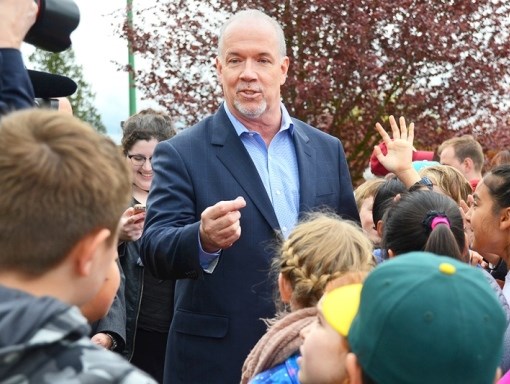With its first budget in sight on the near horizon, the NDP government is about to discover the heavy lifting that comes with being in government.
The Site C dam decision was an early test of a tricky issue, but more significant challenges await Premier John Horgan and his NDP caucus colleagues.
Until now, the NDP has largely been playing the hand dealt by its predecessors, the B.C. Liberals, but that all changes when the government’s first budget is introduced in a matter of weeks.
The NDP is probably regretting stuffing so many expensive and lofty promises into its 100-page campaign platform last spring (building 114,000 housing units or creating 96,000 construction jobs, for example).
The party knew it was facing an uphill election battle, so it made “affordability” and increased government service levels the heart of its campaign platform and dressed it up with all kinds of detailed promises, many of which are going to be tough to fulfil anytime soon.
Look for the B.C. Liberals, once they clear up their leadership question next month, to revisit that platform and focus on NDP promises like these in the coming year:
HOUSING
While in Opposition and during last spring’s election campaign, the NDP argued that government action could have a direct and relatively quick impact on the housing crisis in Metro Vancouver, both at the ownership and the rental levels.
The New Democrats castigated the B.C. Liberal government time and again for dragging its heels and doing relatively nothing (it eventually brought in a foreign buyer’s tax) to solve the crisis.
But the NDP is now in charge, and expectations are high (rather unrealistically, I think) for the new government to take the kind of action that will make homes more affordable, and more available.
Finance Minister Carole James has said “everything is on the table”, including (most likely) a speculation home buying tax. We’ll see more details in the budget, but if housing prices remain high and rental units remain scarce and expensive, the NDP will begin to feel the kind of political pressure the party inflicted on its predecessor.
There’s also that other housing-related promise the NDP doesn’t seem to want to much talk about anymore: a $400 “renter’s rebate” cheque for all tenants. Given the budget pressures James appears to be facing (she’s promised to deliver a balanced one, even though she’s about to lose more than $1 billion from Medical Service Premiums, which have been cut in half), I wouldn’t be surprised if this promise remains on the shelf for a while.
CHILD CARE
This was one of those fairy-tale-like campaign promises of the NDP. For political reasons, the party insisted on adopting a $10-a-day child care system, knowing it would appeal to all kinds of young families struggling to financially survive in Metro Vancouver’s suburban ridings, where the election would most likely be decided.
It’s a nice slogan, but not terribly well thought out. Such a program needs money (a lot of it: more than $1 billion), but it also requires substantially more trained child-care providers and actual physical spaces to locate daycare operations.
Finance Minister Carole James is now characterizing this promise as a “10-year plan,” but I’m not sure voters who thought the magic pixie sprinkled on everything during the campaign would actually turn into an immediate payoff are going to be impressed by any serious delay.
ELECTORAL REFORM
The NDP is in favour of changing the way we elect a provincial government to some kind of proportional representation model, which the B.C. Liberals vehemently oppose.
There will be a provincewide referendum on the issue next fall, and the Opposition has accused the NDP government of stacking the deck in favor of PR through what it claims will be a heavily biased referendum question.
We haven’t seen the question yet, but the legislation does allow a biased one to potentially be on the ballot. Don’t be surprised to see legal action taken if the government forges ahead and turns it into a preferential ballot, with multiple choices.
In any event, get ready to hear a lot of noise about this one in the coming year.
Keith Baldrey is chief political reporter for Global B.C.



